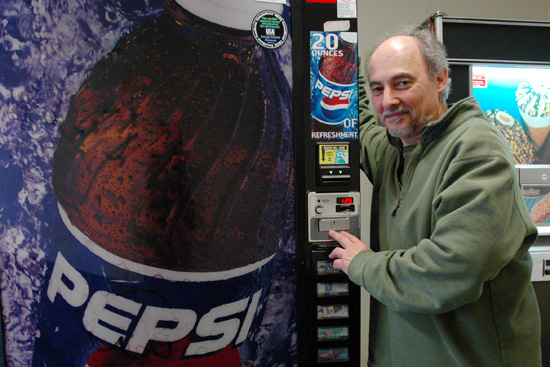Soda Machine Betrothal or False Memory?
 |
| John Seamon, professor and chair of the Psychology Department, led a study titled the study, “Do you remember proposing marriage to the Pepsi Machine? False recollections from a campus walk,” which appeared in a recent issue of Psychonomic Bulletin & Review. |
| Posted 04/17/07 |
| Did you propose marriage to a Pepsi machine two weeks ago, or did you just imagine it?
That’s one of the questions John Seamon, professor and chair of the Psychology Department, asked participants in a study designed to determine if memories, and, in particular, bizarre false memories, could be implanted. “We were interested in seeing if merely imagining different events could, over time, lead people to sometimes mistake imagination for recollection,” says Seamon, who worked with co-authors Morgan Philbin and Liza Harrison, both undergraduates at Wesleyan when the study was initiated. Given that all of us sometimes mix up the source of our memories, we wondered whether people would misremember bizarre actions as well as familiar actions, Seamon says. We thought the best way to do this was to do a study that had participants engage in actions or imagine actions that were either familiar or intentionally unusual. The study, aptly titled, “Do you remember proposing marriage to the Pepsi Machine? False recollections from a campus walk,” appeared in a recent issue of Psychonomic Bulletin & Review. Which brings us to people on bended knee asking for lifetime commitments from Pepsi machines or not, but imagining it depending on instructions. Those instructions came during a series of walks around the Wesleyan campus. During the walks, 40 participants were asked to stop at a total of 48 separate locations. At each location the experimenter read an action statement; participants were asked to perform the action, watch the experimenter perform it, vividly imagine themselves performing it for 10 seconds or spend 10 seconds vividly imagining the experimenter performing it. Of the 48 action statements involved, 24 involved familiar activities such as, “Check the Pepsi machine for change” or “Wave from the top of those steps.” But the other 24 covered more bizarre actions, including “Recite the balcony scene lines from Romeo and Juliet,” “Pat this dictionary and ask it how its doing,” as well as “Get down on one knee and propose marriage to that Pepsi machine.” One day later, the same participants went to 36 locations along the previous route. This included 24 locations from the first session, including 12 locations where actions were previously performed, 12 locations where actions where previously imagined, along with 12 new locations which featured actions that were not used before. This time around, the participants only imagined each action, and they rated their images for vividness. At no time during either walking session was any mention made of a memory test made. Two weeks later, participants were gathered and asked questions about the 72 action statements from the two campus walks. Roughly 12 percent of the merely imagined actions were remembered as performed. The results may surprise some, but not Seamon. “This is consistent with similar studies that have been done in the laboratory. We moved it into the real world,” Seamon says. “Even when presented with bizarre actions such as the proposal to a soda machine, after a couple weeks, some participants had false memories inspired by their imaginations. Seamon adds that these studies point to the danger of using techniques such as guided imagery in the course of psychotherapy to recover lost memories. People can be confident about their recollections and accurate, and they can be confident and wrong. “Without some corroboration, we just cant tell the difference,” Seamon says. “Clearly, when accuracy is critical, we should always seek some verifiable evidence that supports our recollections. Our memories are usually, but not always, a pretty faithful guide to our past. Otherwise, wed be in real trouble as a species.” |
| By David Pesci, director of Media Relations |

